
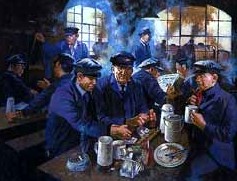
The quest for an 8 hour day on the L.B.S.C.R., was originally raised on the 18th August,
1908, a deputation of Brighton Enginemen and Firemen, met the Locomotive Superintendent Douglas Earle Marsh and his Running Assistant John Richardson (Earle Marsh's No.2), to seek redress off their grievances. The former had to tread carefully for in these early days of locomotive associations there were rival groups seeking to speak for the Enginemen and Firemen. Marsh did his his utmost to play them off against each other, opening with "First of all, tell me whom you represent?”
The Group Secretary, C. Allinson, replied,
"I might say we represent the majority of the men on the Brighton system - the Running men. I can authoritatively say we represent the majority of them.”
Marsh stepped in; "That is certainly contary to information I have from the men themselves.
you are aware that the last year I saw a deputation who represented some 900 Enginemen
and Firemen.”
Allinson, "We represent members of the 'Society' , and a large number who don't belong to
either.”
Marsh "Why do you not avail yourselves to the Conciliation Board?”
Allinson "This is only a preliminary meeting.”
Marsh then pulled out his premediated cudgel with which to deal with this deputation. I have a letter from the other members, who state they represent the majority of the men - a very reasonable letter - in which they say they recognise the financial state of the Company at the present time, and do not wish any of these demands to be considered for the next twelve months. They hold 900 signatures of Enginemen and Firemen to that effect. We have been stopping carriage building, and are getting rid of men, and it is not likely the Company will save money with one hand and spend it with the other. If it came to a Conciliation meeting, the Directors will also have their proposals which might put you in a very worse position than you are today.
(In this context it is worth noting that following interview between Marsh and six Enginemen in July 1907, the daily rate of pay for drivers with nine years' service was revised up to 7s. 6d. and Firemen with six years' service up to 4s. 6d. This modest increase in wages rewarding experience was to cost the Company a mere £1,130.)
The other item was the 8 hour day: "We are kept almost at work and we feel 8 hours per day
is sufficient for the responsibilities we have". Again Marsh made the financial calculation.
It means £30,000 a year. I can assure you this is not the time to ask such sweeping advances
as you are doing here. I may say the Directors are now considering further retrenchments,
and I don't I think they would for a moment consider these, especially in the face of the letter I received from the other deputation that these matters stand over 12 months. Never is not a very opportune time from your point of view to press any demands.
Marsh was quickly back to questioning their credentials.
"Do you represent the Countrymen as well as the London men?" and found himself mired on the question of extra costs in living expenses in London where men were demanding an extra 3s. a week so as to come in line with other Companies, and in the vastly different costs of living in Eastbourne vis-a-vis Horsham.
Marsh who had previously worked on the Great Northern Railway Company, showed no
sympathy for the deputations requests. Marsh's response was; "I advise you not press claims
at this present juncture. You could not find a worse time. You do not have such strenuous work as they do on the Northern lines. You do not have such hard work when firing your engines.
This is more or less a tram line as compared with the others. Well I do not know that we can
get much further. If you take my advice you will let the matter dro for the time being. you
evidently are not the representatives of the majority of the men, if I am to attach any
importance to this document from the other deputation.”
Before he could finish Marsh was asked whether he considered 8 hours a day an
unreasonable request. Marsh replied “that most of the work on this railway fell short of
justifying an 8 hour day," and quoted the 8.45 train from Brighton returning with 5 p.m. train only to be reminded by Richardson. "He takes a train to Wimbledon and back to London in the meantime." Marsh then opened the floodgates: "If you give men any special instance, I am willing to consider the cases" and the representatives quickly waded in:"I was on the main line firing on the 'Wilseden turn.' There is very little opportunity of having a mouthful of food at all." His colleague quoted an extreme case:
I had the 11.25 down to Worthing a week ago last Saturday. Certainly it was late down, but in every circumstance it is closely timed. We are entittled to get a little food at some time. A man cannot go for 10 hours. On this particular occassion i went on the table at Worthing 10
minutes past 2 for the 2.20 back to Brighton.I had a quarter of an hour to turn and grt bacvk
for the 3.35 p.m. Half an hour late consequently I had not sufficent coal, had to scramble
over to Fratton for coal, and I would like to point out to you, Mr. Marsh, although we may
not have quite the stress of the Northern lines, we are mostly kept shunting and almost
continually at work.
Marsh sopped this tirade;
"If you will be advised by me, you go away and drop these matters pro tem. I do not think you there is any possibility of your getting anything. In fact we are getting rid of men here in the shops, and working on short time against my wish, but the financial situation embrasses the Director so much that it has to be done”
On 8th February, 1909, it was the turn of the delegation appointed by A.S.L.E.F. to meet
Marsh. Credentials were immediately questioned. The Association numbered 645 men on the footplate plus a small number of Cleaners. Marsh queried;
"But what about the 900 odd men you said you represented the last time you were here?" That included signatures from some of the other Society," came the reply. Marsh explained: "I have been marking time with Gill and that lot, but it would be a bad thing for you and all the Engine men on the line if they go to arbitration. I cannot see what on earth their game is. They must know they have got more benefits than the Northern lines.”
Under discussion were the terms of service , whether the delegation represented the majority
and of this the Board of Trade would need to be convinced, the question of arbitration and of
more frequent medical examinations. The latter was a major concern as it related to
accidents caused by the mental condition of the men who feared an increase in the number
who would be certified as unfit.
"A rcommendation by the Board of Trade cannot be lightly brushed aside, you know." Marsh
explained. In reply to the question of "How often?" he summised "I have in my mind every
five years as a reasonable time." He was asked what would be the effect on a man's position
should he fail to pass the examination . "Speaking off book somewhat." Marsh responded, “I
should say it would not interfere with their claims on the Pension Fund.”
Marsh then switched to "How is it the Amalgamated Society complained of the treatment of
the men at Battersea?" It brought forth the fact that within the past two years there had been
40 cases of men passing signals at danger. Driver Cooper of Battersea commented "That is
the fruit of an all grade Society.
There is a difference between overshooting and running past if a man tries to stop." To which Marsh retored, "We have had several bad cases, Cooper, not of which Marsh not of running one but two or three!" Cooper rejoined; "As regards the Conciliation Board, we shall do all in our power to upset the other side in going to the Arbitrators," causing Marsh to conclude, "Judging from the state of trade, this is about the worst time to go to any Arbitrators about the questions of any advances.
At the end of March it was reported that the Locomotive Superintendent had received pettions for improved conditions of service from the men in his department. Referred to the Board, the proposals were refused and counter proposals laid before the Conciliation board.
adapted and extracts from the book
Douglas E. Marsh: His Life & Times
By Klaus Marx
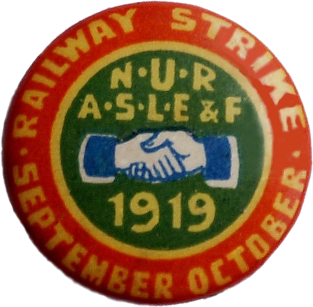
THE SECOND NATIONAL RAILWAY STRIKE
FRIDAY 26th SEPTEMBER - SUNDAY 5th OCTOBER
The second national Railwaymen’s strike commenced at midnight on Friday 26th September
1919, primarily over the issue consolidation of war bonuses of 33 shillings, and the reduction of the working day to eight hours. The strike only finally being settled with the intervention of Downing Street on Sunday 5th October 1919.
This strike was to affect every part of the railway network through out the country, unlike the strike of 1911, where it was only in the industrial towns of the Midlands, the north, Wales and Scotland.
The 1919 strike crippled the entire country with no trains running, no merchandise being
moved around the country, which would eventually bring the country to a standstill, with
industry closing and food banks being set up to enable rationing.
The railwaymen were fighting not just the Government/the railway companies, but the vast
majority of the public opinion that was stack up against them.
This was to be the third strike that the Brighton Branch had supported during 1919.
The scene at Brighton Central station on the morning of Friday 26th September, saw many
carriages standing alongside the empty platforms, but the engines were conspicuous by their
absence, and the signal-men were not in their signal boxes. By 8.40 not one train had
departed from Brighton, but during the morning a small service run, which included four
motor trains between Worthing - Brighton - Lewes, there was also one train to St Leonards
which departed at 12.30, and four trains to London Bridge. The the last London Bridge
departed at 12.30, and none of these trains returned back to Brighton. One thing was quite
clear that there would be no more trains running on that day, with many carriages still
remaining in the platforms and still waiting for their engines to be attached to them. The
following day there was no trains arriving or departing Brighton.
On Monday 29th, there was another limited service, four morning trains to London Bridge,
two Worthing and one train to Crowborough and another to Eastbourne. A curtailed service
operated on the Chichester to Selsey line. During the day, the Brighton Labour Party held a
private meeting with the striking railway workers to discuss the situation of the railway strike.
A Government statement appeal for civilian volunteers pocessing qualifications as engine
drivers, firemen, signalmen, or other work, to get in touch local railway officials, also persons experienced in the organisation and running of mechanical transport were requested to apply to the divisional road transport officers. Volunteers in the Lewes district applied to 64, High Street, Lewes, and in the Chichester district to 93, East Street, Chichester. The Government hoped that demoblized officers and men experienced in this branch of transport will respond to this appeal. Able bodied men were asked to enrolled as special constables, and wireless operators with military experience are invited to register at Command Headquarters.
On Sunday 28th September, an attempts of train wrecking took place at Pulborough and a
further attempt took place at Warnham on Tuesady 30th. At Pulborough flagstones were
placed on line, the military are guarding the station, and at Warnham boulders were on the
track near the station, and in consequences arrangements were made for the line to be
patrolled by special constables.
There was little sympathy towards the striking railwaymen by the residents of Brighton and a cross the county, with the general opinion was, that railwaymen have been treated generously from the start the of the War, and the public have borne the burden of heavy fares and the increase in taxation for their benefits. Food supplies through out the country were so badly effected, and food rationing was introduced. Many retailers were now refusing to serve striking railwaymen. There was a common opinion that the quickest way of ending this strike was for everyone to refuse to serve any railway servant who was on strike.
On Tuesday 30th, the Brighton Central station was a crowded scene with hundreds of
volunteers who had come forwarded and placed their services at the disposal of the railway
officials, and although the lack of necessary experience prevented many of them being
accepted, in others they were made used of and very serviceable contributions for the
dispatching of trains.
It was also felt by many ex-service men, that Trade Unions had deliberately kept men away
from the fight for the freedom of the Empire, and that railwaymen had been paid big wages
whilst "Tommy" had fighting for their safety and freedom. Many unemployed ex-servicemen, believed that the Government should dispense with the service of the striking railwaymen, and in many cases as possible fill their places with ex-service men who were still on the unemployment list and were anxious to obtain work, and let the dissatisfied railwaymen seek employment elsewhere. The Brighton Branch of the Comrades of the Great War, advertised in the local papers, urging their members, who are willing to assist the authorities during this case of emergency, to call at once on the Secretary, 157, North Street, Brighton.
Among the volunteers were a number of ex-station masters, who acted as guards, as well as
station masters from places where no trains are running. A number of the drivers and firemen of the Associated Society of Locomotive Engineers and Fireman, which is not connected with the N.U.R., have remained loyal. There was no lack of drivers at Brighton shed, and the difficulty was off the working of signal boxes. Brighton Central Signal box for example was being worked by one person, the Mr. Greenyer, the station platform inspector at Brighton station. This signal box in normal operation, would have be manned by three signalman per shift.
At Bognor, the Stationmaster, Mr. Gillham, with the assistance of Inspector Brets, and
Sergeant Cannon were able to restore a partial train service between Bognor and Barnham.
The train was worked by voluntary helpers.
The railwaymen on strike at Eastbourne indulge in a game of football at the Old Town, on the afternoon of Monday 29th. The general feeling in Eastbourne was also against the strikers.
There was a number of "blue boys" stationed at Summer down Camp, and the a great
majority of them would be willing to serve in any capacity that would assist the authorities in dealing with any emergency that may arise.
At Tunbridge Wells, with the exception of the Station master, booking and parcels clerk, and
one Head Porter, all the railway workers at both Tunbridge Wells stations were out on strike.
No trains arrived or departed Tunbridge Wells West station.
Tuesday 29th September, saw a slight improvement in the train running in and out of
Brighton, with a small return of railwaymen to aid the volunteers in operating the trains, and a proposed timetable of 32 trains departing out of Brighton. This was to become more apparent as each day passed as more trains were running.
There was a very limited service on the Selsey railway which would indicate that there was
some form of railway trade union on this line. If any of the Enginemen were in A.S.L.E.&F.
they would probably be members of the Bognor Branch.
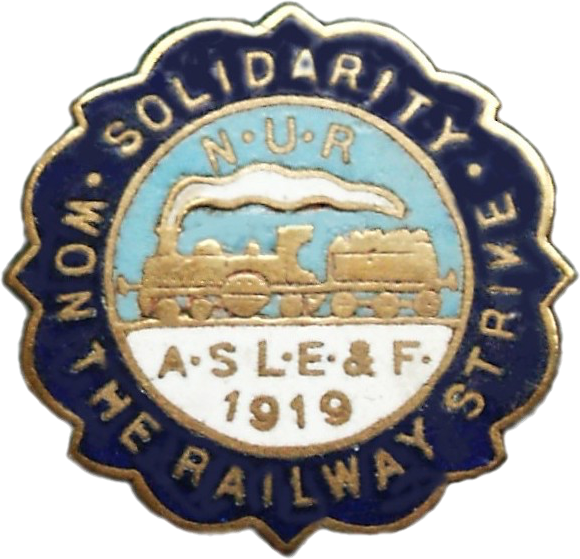
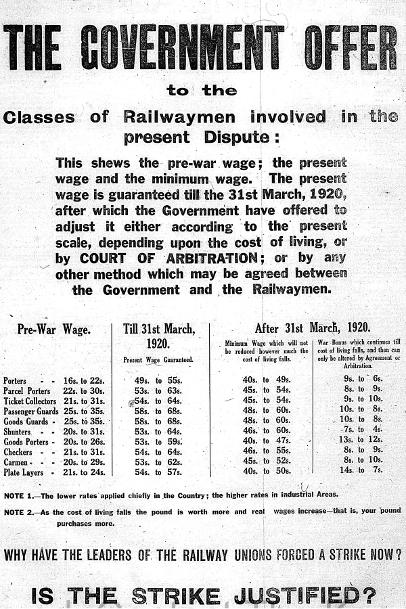
WAGES WITHHELD
GOVERNMENT TAKES FULL RESPONSIBILITY
The following Government statement was issued from 10, Downing Street at 7 p.m. on
Thursday 2nd October.
A question has arisen as to the pay of railway workers which have fallen to be made this week if they had not gone on strike. The Government take full responsibility for the decision to withhold payment of this money. The men have broken their contracts. They stopped work without due notice and in complete disregard of the effect of their action on the persons and property of the ordinary citizens of which they were in charge. They inflicted damage on a number of able people.
They left food on which the public depend for subsistence to perish. They put vast number to great expense by leaving them stranded for conveyance, and inflicted great loses upon many by preventing them from reaching their destinations. The damage in which they are liable in law are vastly greater than amount which is now being withheld.
Different consideration may arise if an early resumption of work takes place. In the
meantime, the country is still subjected to an unexampled injury by the action of the
railwaymen, and in these circumstances the Government would not be justified in handling
over to the strikers a sum that must be used to prolong a struggle which was undertaken
without any consideration for the welfare of the public, and which is endangering the whole
life of the nation.
In the ordinary way, Friday is pay day, both at Brighton Central station and the locomotive
works, but in accordance with the decision in London a notice was posted to this effect:-
"No payment of wages will be made this week to any employee
who has been on strike."
The strikers accepted the stoppage philosophically, or least, with the best grace possible, and
there was no sign of disorder. A notice posted outside the Labour Headquarters, in London
Road, warned the strikers that in view of the Government's decision that the railwaymen were not to be paid their wages, they should not present themselves at the pay offices or take any action until instructed so to do. The advice was adhered to and the striking railwaymen
followed to this advice to the letter, with no application for pay was made during the course
of the day at either at the Brighton station or at works.
Another notice posted that was posted at the Labour Party Headquarters, bears the significant announcement
"No wages - no rent”
This was just another attempt in trying to intimidate the striking railwaymen. OnFriday saw
43 trains running in and out of Brighton which was a similar number to the previous day, but
with an addition of four trains running to Horsham, and on Saturday 4th October twenty-two
engines were be employed on the L.B.S.C.R., for the movement of merchandised mainly
food, but there was still no trains running in and out of Bognor and Littlehampton.
Monday 6th October, with the striking railwaymen slowly returning back to work, there was
no additional trains running out of Brighton, and the times of the trains arriving and departing Brighton, would be the same as on Saturday. This appears to have been situation adopted all over the London Brighton & South Coast Railway.
At Eastbourne, between 400 to 500 striking railwaymen formed up at the Labour Rooms, in
South Street, on Monday morning, and headed by the Strike Executive Committee, marched
back to work. They expressed their disapproval of the out come of the strike.
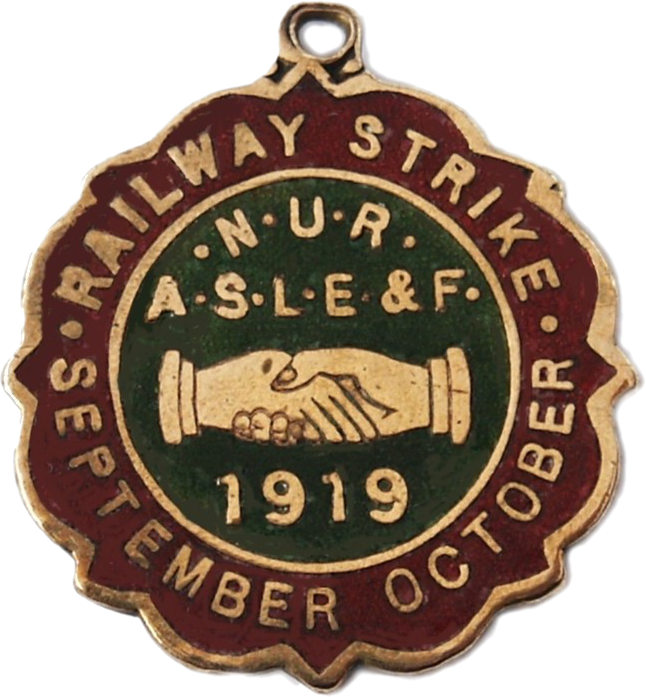
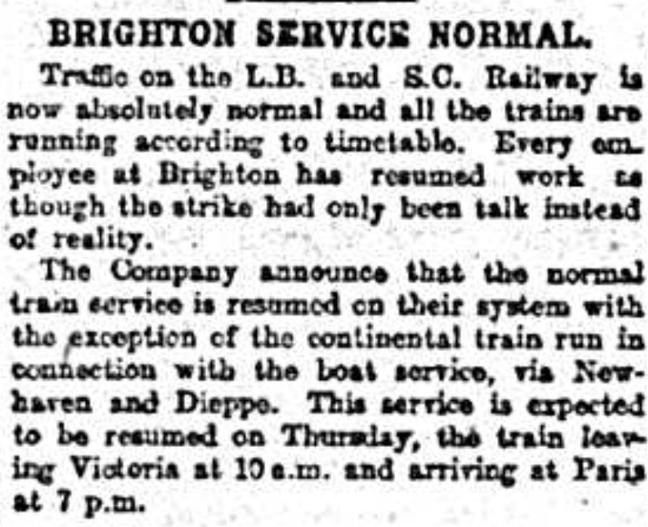
FOR THOSE WHO WERE LOYAL
BRIGHTON EVENING ARGUS
TUESDAY 7th OCTOBER